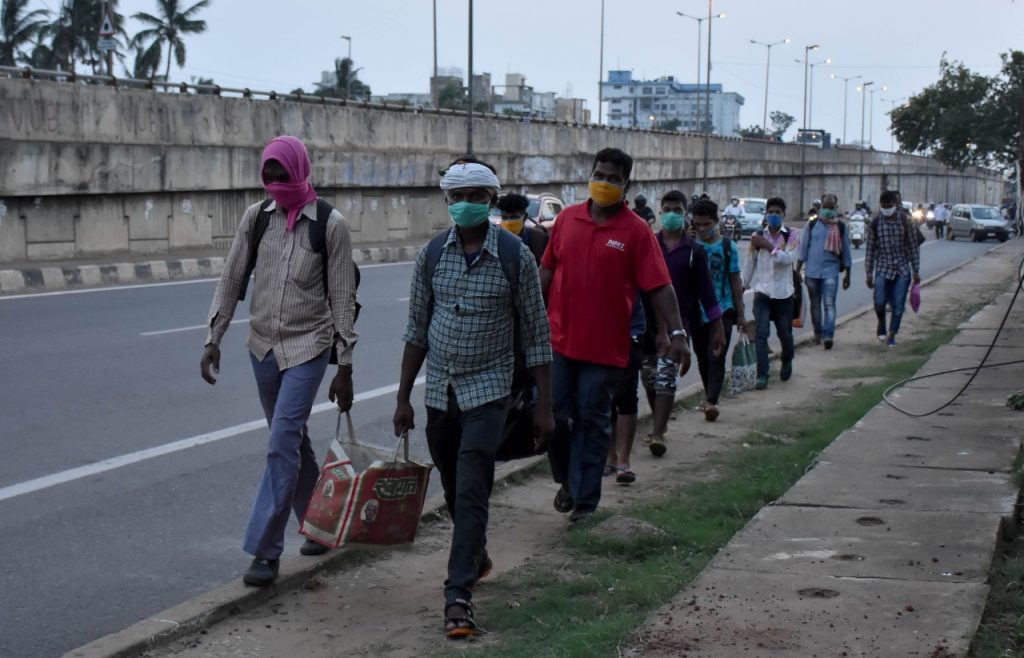With sectors of the economy opening up after nearly a three-month shutdown, the overall mood across the nation remains gloomy. The daily COVID infection toll rose to the level over 8,000 and total infections are nearing the two-lakh mark – a far cry from the scenario when the nationwide lockdown started on March 24 midnight. Still, Prime Minister Narendra Modi stated on Sunday in his Mann Ki Baat radio programme, that the infections are localized and the spread of the virus across the nation remains in a controlled state. On the other hand, it is interesting to note that every day the number of positive Corona cases breaks the record of the previous day. All this go to show that there was neither previous planning nor any contemplation on possible different scenarios that could play out due to the lockdown.
The latest broadcast of Mann Ki Baat was also another occasion for a fresh treat of lip-service to the migrants and the poor. The PM acknowledged that the worst-affected are the poor and the labourers, and said their pain, agony and ordeal cannot be expressed in words. Complaint however is that his government was found wanting in action over such a long period of time to mitigate the sufferings of crores of migrant labour. The problem of migrant labour came to notice first at New Delhi’s Anand Vihar bus terminal on 28th March, just three days after commencement of lockdown. This magnitude of human movement was a few kilometers away from the PM’s bungalow and should have been taken as a grave indication of impending sufferings. Decisive action at that stage could have avoided tragedies of epic proportions. This was followed by the rush of migrants at Mumbai, Surat, Bangalore, Tirupur and many other places, one after another. The absolute non-reaction of the government to this crisis proved that not only did the migrants miss the bus; the government too missed all these opportunities to rectify its colossal blunder.
The PM also noted that the plight of migrant labour had to do with the lack of development of the eastern region, from where large numbers of migrant workers are drawn to industrial hubs like Mumbai, commercial centres like Delhi, and other growth zones. Question may be, was he really not aware of this situation prior to the lockdown. The Central government barely lifted a finger in an effort to help the migrant labour force return home with least inconvenience. The army could have been used to tackle the problem partially since it has a huge fleet of vehicles, mobile kitchens and a command structure with disciplined men to carry out such an operation. Otherwise, the government could have announced that migrants need not panic and should stay put wherever they are. In return, the government could have transferred minimum funds directly to individuals, based on their Aadhaar cards, to cover food, rental and other minimum expenses for the entire lockdown period. Alternately, the government could have transferred funds to employers of the labour to pay wages and tide through the lockdown period. That would have assured an efficient reopening of commercial establishments and factories, which in turn would have given a boost to the economy.
While the stimulus package announced by the Centre has a small component for migrant labour, it falls short of the requirements on the ground. Also, even granted that some of the plans will be implemented, whether the benefits would reach the poor is doubtful, considering the past records of such governmental activism. In this context, the announcement by the West Bengal government to directly reach governmental aid for the Amphan hit families – some five lakh of them – via their bank accounts is significant. The state government apparently heeded an advice from Nobel laureate Abhijit Banerjee to go for direct cash transfer.
Still coining phrases like ‘Vocal for Local’ and talking about self-reliance of urban centres as well as villages may sound entertaining. However, not much can be said about many localities in this vast country. Government seems to be abdicating its policy making role. It could have taken many pro-people decisions at appropriate times during this long lockdown period. It utterly failed to respond to any emergencies. The Prime Minister said he desired every part of this nation to become ‘atma nirbhar’ or self reliant. If that should happen in reality then there might not be any need for a centralized leadership or smart talking leaders. India, as a landmass with a large population has existed since time immemorial. The only difference arose in 1947 when we chose the path of democracy and elected our leaders. With their failure comes the thought of a tunnel turning dark at the end.
